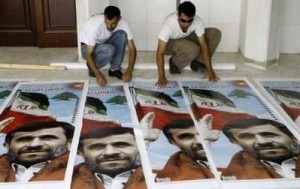 Mahmoud Ahmadi-Nejad will savour every moment. Stung by opposition at home, where even his own fundamentalist friends now dislike him, he will be feted in Lebanon on Wednesday, a country where he can expect genuine welcome from at least part of the population.
Mahmoud Ahmadi-Nejad will savour every moment. Stung by opposition at home, where even his own fundamentalist friends now dislike him, he will be feted in Lebanon on Wednesday, a country where he can expect genuine welcome from at least part of the population.
While he celebrates Iran’s close ties to Lebanon and its Shia community, he will also thumb his nose at the US, which has publicised its unhappiness about the visit. And he will delight in tormenting Israel by reaching so close to its northern borders.
But if the trip comes at an opportune time for the embattled Iranian president, the timing could not be worse for Lebanon.
Mr Ahmadi-Nejad is landing in a country in turmoil, torn apart by a political drama in which Tehran plays an important role. For months now, Iran’s main ally in Lebanon and Israel’s main foe in the region, the militant Shia group Hizbollah, has been on a relentless campaign against a UN-backed special tribunal that is expected to indict some of its members over the 2005 killing of Rafiq Hariri, the ex-prime minister and Sunni leader.
Arguing that the tribunal is politicised, and the indictments, which could come before the end of the year, are unacceptable, Hizbollah has warned of disastrous consequences.
Some of the organisation’s allies say the charges, which they see as designed to destroy Hizbollah and the resistance it puts up against Israel, will provoke a bloody Shia-Sunni conflict. Others say the political crisis is certain to paralyse institutions and could lead to the collapse of the national unity government led by Saad Hariri, the son of the assassinated leader.
For opponents of Hizbollah, Mr Ahmadi-Nejad’s official visit, although planned long ago, will only serve to highlight the country’s deep divisions and embolden the organisation. So fearful is the US of the show of support planned by Iran’s allies that it has warned its citizens in Lebanon to avoid public gatherings.
To be sure, the UN investigation into Hariri’s murder on which the tribunal will be based has been contentious. Seen as a rare example of a quest for justice in a Middle East where political assassinations have long gone unpunished, its initial findings pointed to the involvement of Syria, the neighbouring power that controlled Lebanon back in 2005 and remains a main backer of Hizbollah (and was forced to withdraw its troops after Hariri’s death).
But a series of witnesses who came forward to implicate Syria then recanted and the focus of the inquiry appears to have turned, at least for now and at least in terms of execution, on to Hizbollah operatives.
Is there a way out? Politicians in Beirut say what Hizbollah ultimately seeks is what the younger Hariri cannot deliver: a declaration that Lebanon no longer considers the tribunal credible.
As tensions have escalated, outside powers, which compete for influence in Lebanon, have grown alarmed. In August, Saudi Arabia, the main backer of Hariri and the Sunni community and a long-time rival of Syria and Iran in Lebanon, tried to break the deadlock by reaching out to Damascus.
In a dramatic show of unity, King Abdullah landed in Beirut in early August with Bashar al-Assad, the Syrian president, by his side, and both pledged to maintain the country’s stability.
From the Saudi perspective, the joint effort was partly construed as legitimising a bigger Syrian influence in Lebanon, and over Hizbollah, in the hope of weakening the group and Iran’s grip over it.
Damascus, however, has shown no sign that it is interested in changing Hizbollah’s attitude towards the tribunal, or distancing its interests in Lebanon from those of Tehran. Walid Muallem, the Syrian foreign minister, recently said the special tribunal should be replaced by a Lebanese court. Last week a judge in Damascus issued arrest warrants for 33 Lebanese, including some of the security and legal officials closest to Saad Hariri, alleging that they had misled the UN probe.
Now Mr Ahmadi-Nejad himself will dispel any notion that Iran is becoming a lesser player in Lebanon. Though he will be hosted by friend and foe, the message his visit will reinforce is that Tehran’s bond with Lebanon is strengthening and Iran’s valuable ally, Hizbollah, is too powerful to be messed with.
By Roula Khalaf
Photo: Workers prepare posters of Iran’s President in the port-city of Tyre in south Lebanon October 10, 2010.

Leave a Reply
You must be logged in to post a comment.